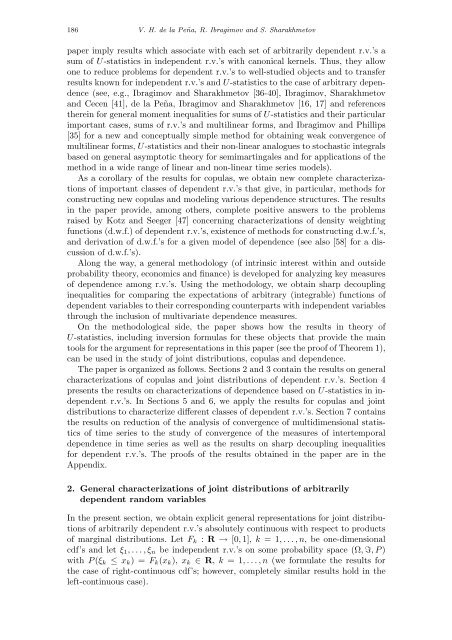Optimality
Optimality
Optimality
You also want an ePaper? Increase the reach of your titles
YUMPU automatically turns print PDFs into web optimized ePapers that Google loves.
186 V. H. de la Peña, R. Ibragimov and S. Sharakhmetov<br />
paper imply results which associate with each set of arbitrarily dependent r.v.’s a<br />
sum of U-statistics in independent r.v.’s with canonical kernels. Thus, they allow<br />
one to reduce problems for dependent r.v.’s to well-studied objects and to transfer<br />
results known for independent r.v.’s and U-statistics to the case of arbitrary dependence<br />
(see, e.g., Ibragimov and Sharakhmetov [36-40], Ibragimov, Sharakhmetov<br />
and Cecen [41], de la Peña, Ibragimov and Sharakhmetov [16, 17] and references<br />
therein for general moment inequalities for sums of U-statistics and their particular<br />
important cases, sums of r.v.’s and multilinear forms, and Ibragimov and Phillips<br />
[35] for a new and conceptually simple method for obtaining weak convergence of<br />
multilinear forms, U-statistics and their non-linear analogues to stochastic integrals<br />
based on general asymptotic theory for semimartingales and for applications of the<br />
method in a wide range of linear and non-linear time series models).<br />
As a corollary of the results for copulas, we obtain new complete characterizations<br />
of important classes of dependent r.v.’s that give, in particular, methods for<br />
constructing new copulas and modeling various dependence structures. The results<br />
in the paper provide, among others, complete positive answers to the problems<br />
raised by Kotz and Seeger [47] concerning characterizations of density weighting<br />
functions (d.w.f.) of dependent r.v.’s, existence of methods for constructing d.w.f.’s,<br />
and derivation of d.w.f.’s for a given model of dependence (see also [58] for a discussion<br />
of d.w.f.’s).<br />
Along the way, a general methodology (of intrinsic interest within and outside<br />
probability theory, economics and finance) is developed for analyzing key measures<br />
of dependence among r.v.’s. Using the methodology, we obtain sharp decoupling<br />
inequalities for comparing the expectations of arbitrary (integrable) functions of<br />
dependent variables to their corresponding counterparts with independent variables<br />
through the inclusion of multivariate dependence measures.<br />
On the methodological side, the paper shows how the results in theory of<br />
U-statistics, including inversion formulas for these objects that provide the main<br />
tools for the argument for representations in this paper (see the proof of Theorem 1),<br />
can be used in the study of joint distributions, copulas and dependence.<br />
The paper is organized as follows. Sections 2 and 3 contain the results on general<br />
characterizations of copulas and joint distributions of dependent r.v.’s. Section 4<br />
presents the results on characterizations of dependence based on U-statistics in independent<br />
r.v.’s. In Sections 5 and 6, we apply the results for copulas and joint<br />
distributions to characterize different classes of dependent r.v.’s. Section 7 contains<br />
the results on reduction of the analysis of convergence of multidimensional statistics<br />
of time series to the study of convergence of the measures of intertemporal<br />
dependence in time series as well as the results on sharp decoupling inequalities<br />
for dependent r.v.’s. The proofs of the results obtained in the paper are in the<br />
Appendix.<br />
2. General characterizations of joint distributions of arbitrarily<br />
dependent random variables<br />
In the present section, we obtain explicit general representations for joint distributions<br />
of arbitrarily dependent r.v.’s absolutely continuous with respect to products<br />
of marginal distributions. Let Fk : R→[0, 1], k = 1, . . . , n, be one-dimensional<br />
cdf’s and let ξ1, . . . , ξn be independent r.v.’s on some probability space (Ω,ℑ, P)<br />
with P(ξk ≤ xk) = Fk(xk), xk ∈ R, k = 1, . . . , n (we formulate the results for<br />
the case of right-continuous cdf’s; however, completely similar results hold in the<br />
left-continuous case).
















